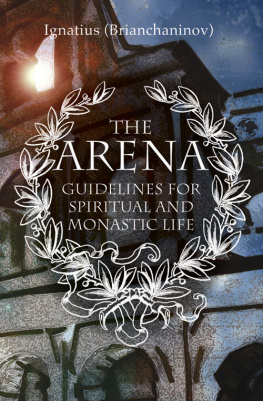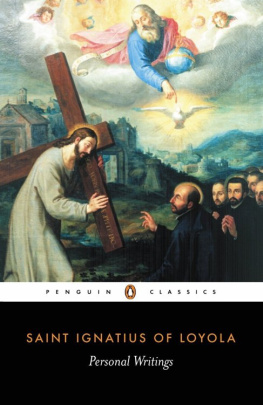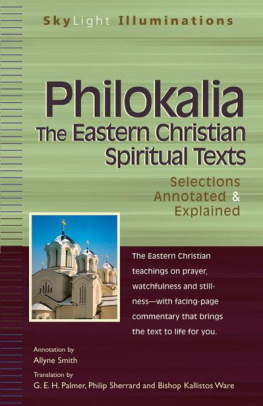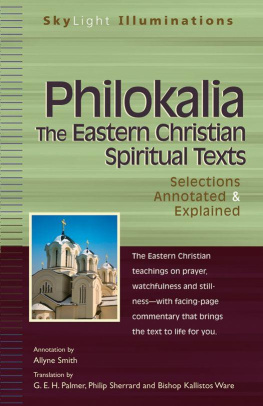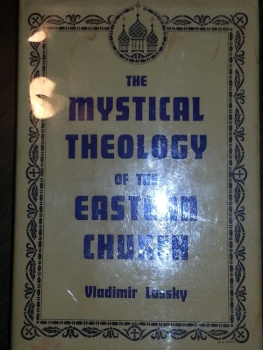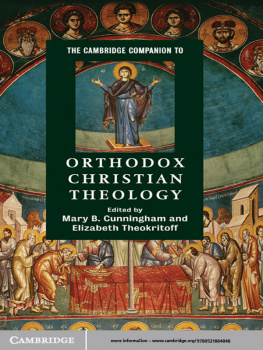The Arena
Guidelines for Spiritual and Monastic Life
by Bishop Ignatius (Brianchaninov)
Translated from the Russian by
Archimandrite Lazarus
With a foreword by
Archimandrite Kallistos (Ware)
Holy Trinity Publications
The Printshop of St Job of Pochaev
Holy Trinity Monastery
Jordanville, New York
2012

Printed with the blessing of His Eminence,
Metropolitan Hilarion First Hierarch
of the Russian Orthodox Church Outside of Russia

The Arena
2012 Holy Trinity Monastery
Second edition

HOLY TRINITY PUBLICATIONS
The Printshop of St Job of Pochaev
Holy Trinity Monastery
Jordanville, New York 13361-0036
www.holytrinitypublications.com
First printing: Madras, India, 1970
Second printing: Holy Trinity Monastery, 1982
Third printing: Holy Trinity Monastery, 1991
Fourth printing: Holy Trinity Monastery, 1997
Second Edition ISBN: 978-0-88465-287-8 (paperback)
ISBN: 978-0-88465-288-5 (ePub)
ISBN: 978-0-88465-289-2 (Mobipocket)
Library of Congress Control Number 2012936902
Scripture passages taken from the New King James Version.
Copyright 1982 by Thomas Nelson, Inc. Used by permission.
Psalms taken from A Psalter for Prayer, trans. David James
(Jordanville, N.Y.: Holy Trinity Publications, 2011).
Apocryphal passages taken from the Orthodox Study Bible.
Copyright 2008 by Thomas Nelson, Inc. Used by permission.
All rights reserved.
Printed in the United States of America
FOREWORD TO THE ORIGINAL ENGLISH-LANGUAGE EDITION

T he work that follows first appeared almost exactly a century ago. Published at St Petersburg in the year 1867, it was originally named An Offering to Contemporary Monasticisma beautiful title that aptly describes the character of the contents. The book is the offering of Bishop Ignatius (Brianchaninov) to his beloved brethren, as he so often calls them in the course of its pageshis contribution to the monastic life of his day. At the same time it is the offering of his whole lifes work to Christ. Writing at the end of his time on earthhe died in the same year that the book was first publishedhe sought to embody in a single volume the fruit of some forty years experience in the monastic life, more than half of them spent as superior of an important community on the borders of the Russian capital. As a traveler who has endured terrible hardships on a long and difficult journey, to use Bishop Ignatius own words, he offers to those who are undertaking the same journey his own notes on the path that he has followed.
Bishop Ignatius composed his Offering at a moment of notable revival in the monastic life of the Russian Orthodox Church. The religious communities of nineteenth century Russia were distinguished by a number of remarkable figuressaints, spiritual directors, and writers: men such as St Seraphim of Sarov, the startsyof the Fathers concerning the monastic life, adapting what they say to the particular needs and conditions of his own day. As such, it is a book that will be of great value to anyone who wishes to understand Orthodox monasticism in general, and in particular the Russian monastic revival of the nineteenth century.
But Ignatius Offering is very far from being a work exclusively for monks. As the author himself says, We hope that even lay people may also find our book helpful. But obviously the same evangelical rules that the monk seeks to carry out are also binding upon all other members of the Church. Ignatius An Offering to Contemporary Monasticism is therefore at the same time an offering to every Christian.
In view of the widely ranging scope of the book, the translator of this English version has chosen another title to indicate its more general character: The Arena. It is a title that recalls the last hours of the Christian martyrs who met their death in such places as the Coliseum at Romemen such as Ignatius own namesake, St Ignatius of Antioch, who prayed that he might be ground as wheat by the teeth of the wild beasts, and whose prayer was answered. For later Christians, living in more peaceful times, there has usually been no such outward and visible arena; but they, too, are called to fight spiritually in the arena against wild beasts. As St Clement of Rome expresses it, we are all in the same arena and involved in the same struggle.is always an inner one, and the arena where the struggle with the beast takes place is the unseen realm of the interior life.
Such, then, is Bishop Ignatius basic theme: he tells us of the struggle to be undertaken by every Christian in the spiritual arena. He speaks to us all, whether monks or not, explaining how we may tame, control, and transform the beast withinthe lions and howling wolves of our inner jungleand so build in our hearts Jerusalem, the city of peace and unity.

Bishop Ignatius is one of the most able and attractive personalities in the Russian Church of his time. By family background, Dimitry Alexandrovich Brianchaninov, as he was at first known, was a member of the aristocracy, the son of a wealthy provincial landowner. In the Russian society of his time, it was distinctly unusual for a young man or woman of noble birth to enter a monastery. In fact, Dimitrys father envisaged no such future for his son, but intended him to follow the way of life normal for one of his class. Born in 1807, in due course Dimitry was sent to the Pioneer Military School of St Petersburg. Here he made excellent progress, winning the praise of his teachers, and during an inspection he was especially noticed by Grand Duke Nicholas Pavlovich, the future Emperor Nicholas I.
But Dimitrys heart was not in his military studies. From an early age he had felt a vivid and insistent call toward an entirely different paththat of the monk. In later life he recounted how, during his time at the Pioneer Military School, he used to walk by himself in deep depression, with tears in his eyes, because it seemed that there was no course open to him except the worldly career of an army officer. Even at the Pioneer Military School, however, he found time to practice inner prayer, and among his fellow pupils he discovered others with the same spiritual longings. They used to meet at night to pray together and to discuss religious questions.
The year 1827 was one of crisis in Dimitrys life. He graduated from military school, successfully taking his commission, but soon afterwards he fell critically ill. At his own request he was granted a discharge from the army. His health restored, he at once became a novice, staying at various monasteries during the next four years, and establishing contact in particular with Staretz Leonid of the celebrated Optina Hermitage. In 1831 he took vows as a monk in a small community in his native district of Vologda, receiving the name Ignatius, and shortly afterwards he was ordained priest.
Doubtless this was not the kind of life that Ignatius had foreseen for himself when he made his monastic profession in 1831; but he applied himself conscientiously to his new duties as abbot, giving the emperor no reason to regret his choice. After twenty-four years as superior of St Sergius, in 1857 he was raised to the episcopate, serving first as bishop of Stavropol and then of Kavkaz (Caucasus). But only four years later, at the early age of fifty-four, he resigned, to spend the remaining six years of his life in retirement at the Nicolo-Babaevsky Monastery in the Kostroma Diocese. Here he lived in seclusion, devoting his time to writing and to a wide correspondence with his spiritual children. He died in 1867 in the solitude for which he had longed from his youth.

